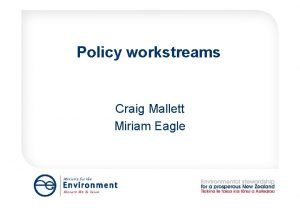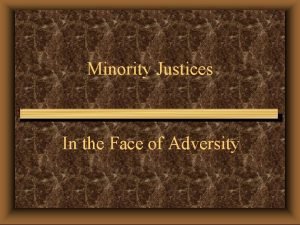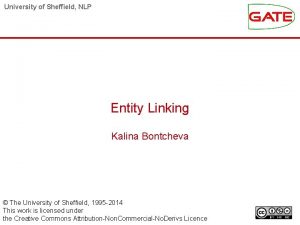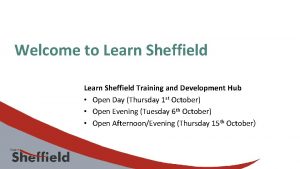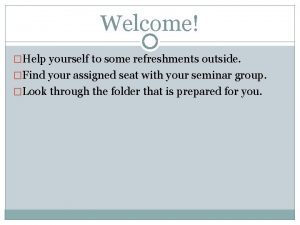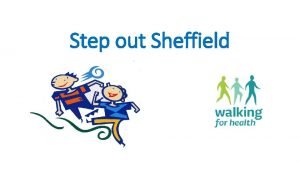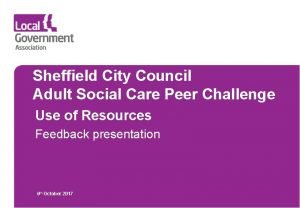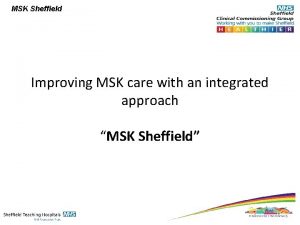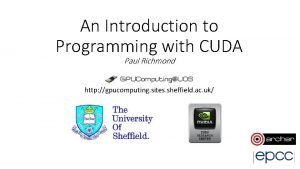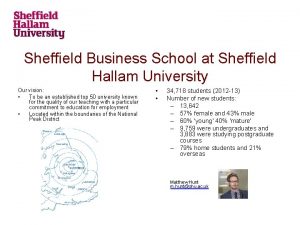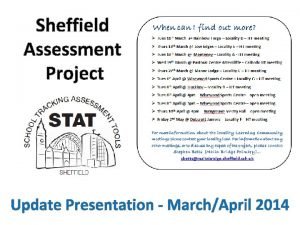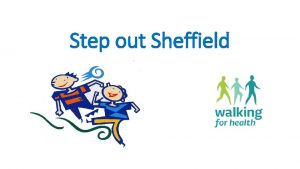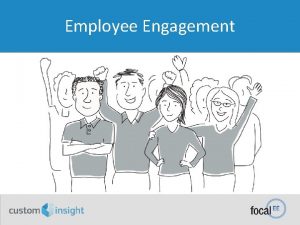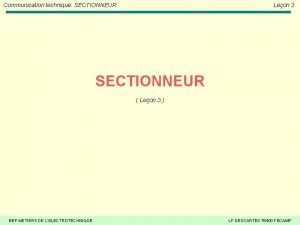Research Impact Engagement Leon Mallett University of Sheffield






























- Slides: 30

Research Impact & Engagement. Leon Mallett, University of Sheffield.

What are social media?


What are social media? Do you know your reddits from your tweets? Social networks – Facebook, Twitter, Google+, Linked. In Social bookmarks – Delicious, Reddit, Digg, Stumble. Upon, Slashdot, Pinterest Blogs – Wordpress, Blogger, Tumblr, Twitter (microblog), individual sites Social media (generic) – You. Tube, Vimeo, Flickr, Instagram, Sound. Cloud Plus… 1, 000 s more

Key social media stats How the social spectrum is skewed. Facebook 1. 1 billion active users, accounts for around 50% of all mobile web traffic, 480 million people use Facebook for an average of 15 minutes every single day, which still makes it the biggest online time-sink You. Tube 4 billion videos are viewed every day, in 2011 the site had 1 trillion hits, it’s also the 2 nd most popular search engine online Twitter over 400 million tweets per day, over 200 million unique active users. Linked. In 200 million users (how many active? not many), niche business network, majority of users between 30 -55 years old Google+ 135 million active users, but low amount of overall activity. High male: female ratio. Mostly young men interested in computer technology Reddit 70 million unique active users, 37 billion page views in 2012. Word. Press 67 million Word. Press blogs, 4. 1 billion page views per month

Before we go into details about social media, let’s talk about purpose. Purpose Organisation & planning Evaluation Action

Think purpose. Everything ? ? ? Evaluation ? ? ? Important point Social media is massive and very dynamic. Too massive and dynamic to wield. You need to focus. ? ? ?

What’s the purpose of social media in the context of academic research? Purpose Organisation & planning Action If you have hope of doing something well, you’ll need a decent plan

What’s the purpose of social media in the context of academic research? Purpose Organisation & planning You can’t make a plan without a purpose Action

What’s the purpose of social media in the context of academic research? Purpose Organisation & planning Action Potential purposes of using social media in academic research Promoting your activity? Learning? Networking with likeminded people? Forming collaborative partnerships? Public engagement? Creating impact? Building your reputation? (personal or group or both? ) Social research? Coordinating international research activity? Making money? Job hunting?

Each tool is different Facebook provides a social and engaging space for your research groups to discuss and display their material. But it isn’t particularly good for professional networking, because: 1) Most people use it for friendship, and it’s awkward to mix business & pleasure 2) Facebook is ‘closed’, so it’s hard to connect with people you don’t know well 3) Facebook audiences tend to prefer less but more-impactful communication, such as a photo album of holiday pictures, rather than a passing thought or opinion. As such, the value of Facebook really depends on what you’re aiming to achieve.

For networking… I recommend Twitter instead. Twitter is great for conversation, passing comment, sharing interesting content, and networking. And even though it only has 1/5 th of the users of Facebook, that’s still 200 m people. But, Your communications are limited to 140 characters per post. This is fine for casual conversation but if you want to share something more substantial, an opinion piece for example, then you’ll need to sign up for a blog too. The good news is this is easy, and it’s also very easy to share your blog/pictures/videos on Twitter. So I recommend both.

So, what should you talk about? Well, it’s up to you, but below are some generic things that work well. Self promotion – marketing – asking people to follow you or share your material ‘Sticky’ topics - topical content (zeitgeist) and breaking news - controversial issues get people talking, but handle with care - interesting and curious worldly facts - unique and unusual photos - entertaining and educational videos - things that defy convention, or appear to - amusing and feel good content* - team spirit* * Don’t forget you’re a human being, not a research automaton, but a layer of professionalism will give some credibility… Find the right balance

Basic rules of thumb - Write in plain English and don’t be afraid of being emotive. - Be aware that everything you post can be considered permanent. - Be friendly, helpful and approachable. - Treat social media (particularly Twitter) like a conversation, not a notice board.

Networking & Social Inequality.

Social media is social. If you’re not willing to engage in dialogue. Don’t bother. - Networking is fundamental to social media. - What applies to real life, pretty much applies on social media. … Who’s heard of Kevin Bacon?

Social media is social. If you’re not willing to engage in dialogue. Don’t bother. - Networking is fundamental to social media. - What applies to real life, pretty much applies on social media. … Who’s heard of Kevin Bacon? Can anyone tell where I’m going with this?

Six degrees of Kevin Bacon. ‘Small world’ theory. Social engagement is not equal. The exponential model for social communication is flawed. Some people have more a lot more friends than others. Malcolm Gladwell calls them ‘Connectors’.


Law of the few. Connectors – lots of contacts Salesmen – persuasive and influential Mavens – Information specialists, highly reliable. - Seek these people out and make them your focus Stickiness. We covered this earlier – the message needs to be engaging. The power of context. The environment/zeitgeist – matters a lot. It doesn’t matter how ‘sticky’ your message is. If you communicate your message at the wrong time, in the wrong place, to the wrong audience it won’t work. But, if you can understand the hivemind and flavour of the month, you can use it to leverage your message.

What you could do

Doing the basics well. Sign up to Twitter and: 1) Network with peers & stakeholders across the globe 2) Talk about current affairs in your research area 3) Engage with your Department Twitter account, as well as staff, students and colleagues, be more than part of the community, be a community champion. 4) Engage with, and share, the University’s content and news, be an advocate for our work here. 5) Create an engaging blog (include pictures) to discuss & share new ideas and concepts.

Blogs Word. Press, Blogger, Tumblr They’re all free, take your pick! Each has its strengths: - Word. Press is the most powerful and sophisticated blog - Blogger is Google-based, dynamic and benefits from SEO - Tumblr is user-friendly and very popular Once it’s up and running, take it a step further, take ownership over your area. Become famous for something, e. g. worldmapper, periodic table of videos.


Going the extra mile. Grow your online reputation - Create a Linked. In account to broaden your networks. - Make your blog even more visual, pics tell 1000 words etc - Utilise social bookmarking to promote your blog (Reddit) - Make simple videos (You. Tube, Vimeo, i. Tunes U) - Be the early mover on new social platforms (eg Pinterest) - Facebook page for your research area

Reddit, and social bookmarking • The front page of the Internet. • Do you surf the web anymore? The chances are ‘not really’ - you bookmark your favourite sites and keep up-to-date with them. • Isn’t that somewhat limiting given the vast size and scope of the world wide web? • Reddit is a social news site, or an interest aggregator, where you can share, view & discuss content related to your interest. • People each have their own favourite bookmarks – Reddit is a where it’s all pulled together. ‘Karma’ is the quality regulator. 1) Find and join the communities relevant to your research 2) Contribute to discussions 3) Make your blog/image/video content engaging so when you share it, it spreads like wild fire.

Share it on Linked. In Tweet about it G+ it Embed You. Tube/Vime o videos on it Blog Share it on Facebook Share it on Reddit etc Connect it to Flickr or Instagram Link it to your website

But, (important note) What is social media? Social. What is social media not? Marketing. So, don’t spam. Don’t turn into a one track record. Learn the etiquette of each platform and… Start a conversation.

Final piece of wisdom (possibly) In my opinion, the central tenet of communication is: To be a good communicator you must… always put yourself in the position of the people you’re trying to communicate with - understand what they’re likely to be thinking about, what they value, and what they don’t. Often this can be done instinctively using your ability to empathise and sympathise, but it can also help to ask for feedback. This is what market research is all about. Reflect on this and you won’t go far wrong.

Any questions?
 Miriam eagle
Miriam eagle Jitasol
Jitasol Conrad mallett detroit
Conrad mallett detroit Years of exploration juan ponce de leon
Years of exploration juan ponce de leon State university of sheffield
State university of sheffield Kalina bontcheva sheffield
Kalina bontcheva sheffield University of sheffield thesis
University of sheffield thesis Social impact stellenbosch university
Social impact stellenbosch university Ozeanklima
Ozeanklima Research gate
Research gate Early childhood research quarterly author guidelines
Early childhood research quarterly author guidelines Types of research impact
Types of research impact Learn sheffield
Learn sheffield Airhouse sheffield
Airhouse sheffield Sheffield nlp
Sheffield nlp Susan cartwright sheffield
Susan cartwright sheffield Stephen betts sheffield
Stephen betts sheffield Step out sheffield
Step out sheffield Adult social care sheffield
Adult social care sheffield Msk sheffield
Msk sheffield Water risk assessment sheffield
Water risk assessment sheffield Tissue types
Tissue types International development sheffield
International development sheffield David hayes sheffield
David hayes sheffield Jodi sheffield
Jodi sheffield Sheffield graduate attributes
Sheffield graduate attributes Paul richmond sheffield
Paul richmond sheffield Sheffield nlp
Sheffield nlp Sheffield schools forum
Sheffield schools forum Martin hague sheffield
Martin hague sheffield Quantum mechanics
Quantum mechanics
